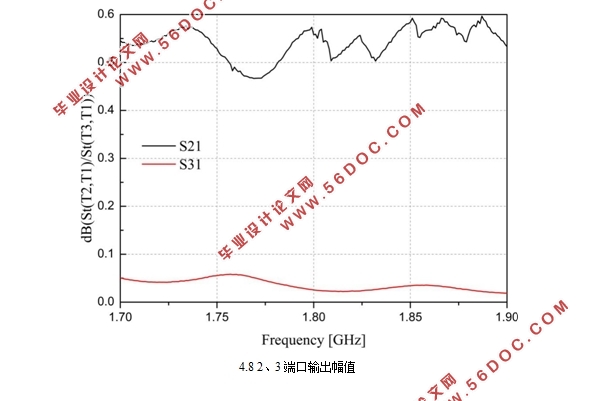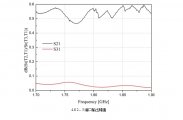一款可重构微波馈电网络设计
来源:56doc.com 资料编号:5D21133 资料等级:★★★★★ %E8%B5%84%E6%96%99%E7%BC%96%E5%8F%B7%EF%BC%9A5D21133
资料以网页介绍的为准,下载后不会有水印.资料仅供学习参考之用. 密 保 惠 帮助
资料介绍
一款可重构微波馈电网络设计(论文12000字)
摘要:馈电网络在现代社会有着相当广泛的应用,对于现在通信技术的发展,传统的单一功分馈电网络己经无法匹配快速发展的阵列天线。本文设计的一款可重构馈电网络,在馈电网络的基础上,选择SMP-1320-079LF型号PIN二极管作为开关元件,引用其在1700MHz-1900MHz时的参数特性,在工作频段对PIN管进行等效电路建模。根据PIN二级管的等效电路模型,分析其开关特性。采用标准阻抗微带传输线,设计功率比是1:1的等分T形结构开关馈电网络,然后根据可重构阵列天线需求,选择3个T形结构开关馈电网络,设计4输出端口开关馈电网络。通过HFSS对模型仿真优化,实现3种2端口输出模式切换,实现天线的极化可重构。
关键词:可重构;T型功分器;PIN二极管
Design of a reconfigurable microwave feeder network
Abstract:The feeder network has been widely used in modern society. With the development of communication technology, the traditional single power distribution feeder network has been unable to match the rapidly developing array antenna. In this paper, a reconfigurable feed network is designed. On the basis of the feed network, the smp-1320-079lf type PIN diode is selected as the switching element, and its parameter characteristics at 1700mhz-1900mhz are cited to conduct the equivalent circuit modeling for the PIN tube in the working frequency band. According to the equivalent circuit model of PIN diode, its switching characteristics are analyzed. The standard impedance microstrip transmission line is adopted to design the equipartition t-structure switch feeding network with a power ratio of 1:1. Then, according to the requirements of the reconfigurable array antenna, three t-structure switch feeding networks are selected and the 4-port switch feeding network is designed. The model is simulated and optimized by HFSS to achieve three kinds of 2-port output mode switching and realize the polarization reconfiguration of the antenna.
Keywords: Reconfigurable; T-type power Divider; PIN Diode

目 录
1 绪论 1
1.1 研究背景以及意义 1
1.2 国内外发展 1
1.3 本文内容与章节安排 2
2 馈电网络的基本理论 3
2.1 微带传输线理论 3
2.1.1 微带线 3
2.1.2 传输线理论 4
2.2 功分器的原理 5
2.2.1 功分器的技术指标 5
2.2.2 功分器基本原理 6
2.3 T型功分器的原理 7
2.4 馈电网络的馈电方式 9
2.4.1 并联馈电 9
2.4.2 串联馈电 10
2.5 仿真软件介绍 10
2.6 本章小结 11
3 可重构馈电网络的设计 12
3.1 设计指标 12
3.2 设计方案 12
3.3 详细设计 12
3.3.1 介质基板的选取 12
3.3.2 贴片宽度的选取 13
3.3.3 馈电方式的确定及阻抗匹配 13
3.3.4 PIN二极管电路建模 14
3.3.5 可重构馈电网络的仿真设计 15
3.3.6 优化设计 21
3.4本章小结 24
4 实物加工与测试 25
4.1 实物加工 25
4.2 实物测试 26
5 总结 29
参考文献 30
致谢 31
|



